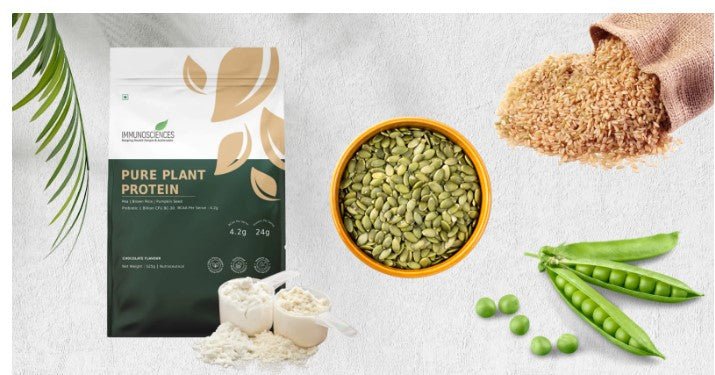But what exactly is plant-based protein powder? Why are so many people switching to it, and is it right for you? Whether you are a vegan, lactose-intolerant fitness enthusiast, or just someone curious about healthier options, this guide will help you learn everything about plant-based protein powders.
What is a Plant-Based Protein Powder?
Plant-based protein powders and natural supplements are made by extracting protein from plants and grinding it into fine powder. Unlike abstract or casein protein, which comes from milk, plant proteins come from sources like peas, rice, hemp, soy, pumpkin seeds, and quinoa.
This powder can be added to water, smoothies, and oatmeal recipes to conveniently increase your daily protein intake.
Why Are People Choosing Plant-Based Protein?
There are many reasons plant-based protein powder is gaining prominence. It contains no animal products, and it's perfect for people with lactose intolerance. Plant protein powders are also gentle on your stomach as compared to abstracts.
Producing plant protein usually requires minimum resources and also has a smaller carbon footprint. Plant protein powders also contain fiber and minerals that are not found in animal proteins.
Common Sources Of Plant Based Protein Powder
Pea protein
It is made from yellow split peas, typically 80 to 85%. It is high in essential amino acids except for methionine. Pea protein is easy to digest, and hyperallergenic mechanics are suitable for a lot of people. It is perfect for vegans and people with allergies to dairy or gluten.
Rice protein
Extracted from brown rice, it has about 70 to 80% protein content. Protein is hypoallergenic and very easy on the stomach, lower in lysine. It is so often combined with pea protein to make a complete amino acid profile. If you have sensitive digestion and avoid soy or dairy, then you must go for rice protein.
Soy protein
It is made from soybeans and mainly has 90% protein content. You can get a complete protein with all essential amino acids, and it has been highly studied for all the health benefits, including heart health. It's perfect for people who tolerate soy and want a complete plant-based protein.
Hemp protein
It comes from hemp seeds and has 50% protein content. It contains omega-3 and omega-6 fatty acids, fiber, and minerals. lower protein percentage but offers additional nutrients and is perfect for people who want extra healthy fats and fiber in their protein powder.
Pumpkin seed protein
Extracted from pumpkin seeds, it has about 60% protein content. It is rich in magnesium, zinc, and antioxidants. Pumpkin seed protein also contains all essential amino acids. It's perfect for you if you want a nutrient-dense plant protein.
Chia seed and quinoa protein
The nutrient content is low, 20 to 25% only, but it is high in fiber and omega-3 fatty acids. You can expect complete protein with 14 to 18% protein content in quinoa seeds, which includes fibers and minerals. Often used in blends for an added nutrition plan to improve taste and texture.
How Does Plant-Based Protein Compare?
Plant protein powders are likely to vary by source and processing, but generally protein content ranges anywhere between 50 to 90%. Most single-source plant proteins are incomplete proteins missing one or more essential amino acids but combining them covers all your requirements. It contains fiber, which abstract protein lacks, helping digestion and fullness.
Who Should Use Plant-Based Proteins?
If you're a vegan or a vegetarian, you can use plant-based protein powder to meet protein needs without animal products. People with lactose intolerance or dairy intolerances can go for a lactose-free alternative to abstract.
If you have food allergies or sensitivities, hypoallergenic options like pea protein can help you. When consumed properly, plant proteins will support muscle repair and growth just like animal proteins.
How to Choose the Right Plant Protein Powder?
When selecting a plant protein powder, consider:
-
Amino acid completeness: Look for blends like pea and rice protein that provide all essential amino acids.
-
Protein content per serving: Higher protein content is better if you have higher protein needs.
-
Digestibility: Pea and rice proteins tend to be gentler on the digestive system.
-
Ingredients: Avoid powders with lots of fillers, artificial flavors, or sugars.
-
Certifications: Organic, vegan, non-GMO, and gluten-free certifications can assure quality and safety.
How to Use Plant-Based Proteins?
It is really simple for you to incorporate plant protein powder into your routine. You can mix it with water, almond milk, or other plant-based milk for a quick shake. Blend into fruit or vegetable smoothies and stir into oatmeal or cereal for breakfast. You can also add it to pancake or muffin batters for a protein boost. If you don't want to change the flavor, you can even add it into your soups or sauces to up the protein.
Environmental Benefits of Plant Protein
Beyond personal health, plant protein powder is better for the planet:
-
Requires less water than animal protein production.
-
Emits fewer greenhouse gases.
-
Uses less land and energy.
Why Choose Immunosciences for Your Plant Protein?
Get 24 g of protein per serving with Immunosciences premium plant-based protein powder, formulated to meet your unique health goals:
-
Clean ingredients without fillers or artificial additives.
-
Products suitable for vegans, vegetarians, and those with allergies.
-
Expert guidance to help you choose the right protein powder.
-
Commitment to quality and customer satisfaction.
Conclusion
Plant-based protein powder is a fantastic, versatile source to fulfill your protein needs. Whether you are a vegan, lactose intolerant, an athlete, or simply looking to eat cleaner and greener, you must choose this protein powder.
When choosing a protein powder, always prioritize a complete amino acid profile, high protein content, and clean ingredients. And always feel free to reach out to nutrition professionals for customized advice. Here is to fuel your body with nature's best.

